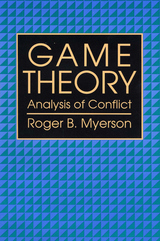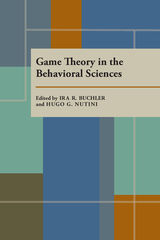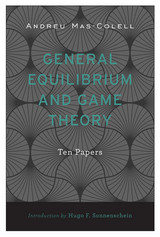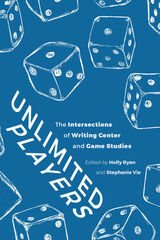
Yet real climate change is a complex social dilemma involving the world’s nearly eight billion inhabitants. In the real world, the worst effects of climate change are likely to be felt by developing countries, while most of the decisions will be made by rich, industrialized countries. And while the world as a whole would be better off if all nations reduced their greenhouse gas emissions, any given nation could decide it would be even better off if it continued emitting and let other nations take care of the problem. These disaster experiments test how real people respond to climate change’s unique constellation of challenges and deliver a positive message: People will prevent disaster.

Eminently suited to classroom use as well as individual study, Roger Myerson's introductory text provides a clear and thorough examination of the models, solution concepts, results, and methodological principles of noncooperative and cooperative game theory. Myerson introduces, clarifies, and synthesizes the extraordinary advances made in the subject over the past fifteen years, presents an overview of decision theory, and comprehensively reviews the development of the fundamental models: games in extensive form and strategic form, and Bayesian games with incomplete information.
Game Theory will be useful for students at the graduate level in economics, political science, operations research, and applied mathematics. Everyone who uses game theory in research will find this book essential.


This collection of essays was the first major attempt to apply game theory, linear programming, and graph theory to anthropological data.
Contributors: John Atkins; Ira B. Buchler; Albert M. Chammah; Luke Curtis; Walter Goldschmidt; Hans Hoffman; Robert Kozelka; Bernhardt Lieberman; Frank B. Livingstone; R. Michael McKinlay; Anatol Rapoport; Richard F. Salisbury; T. C. Schelling; M. Shubik; and Martin Southwold.

Andreu Mas-Colell revolutionized our understanding of competitive markets, price formation, and the behavior of market participants. General Equilibrium and Game Theory offers readers a compendium of his most important scholarly contributions, gathering in a single volume the groundbreaking papers that have solidified his standing as one of the preeminent economic theorists of our time.
Built upon the foundations of neoclassical economics, Mas-Colell’s work is distinguished by a mathematical and analytical elegance that brings theory closer to real-world situations. He overturns the standard assumption of general equilibrium theory—that markets are perfectly competitive and their participants are perfectly rational—and concludes that neither the law of supply and demand nor the existence of equilibrium prices depends on the rationality of agents. Similarly, Mas-Colell (working with Sergiu Hart) challenges classical game theory’s reliance on rational behavior, demonstrating that adaptation and learning shape the dynamics of repeated games.
Addressing central questions of finance, trade, industrial organization, and welfare economics, Mas-Colell shows the surprising power and versatility of differentiability and linear-space mathematical techniques, and he emphasizes the fruitfulness of cooperative game-theory approaches, such as Shapley value theory and the Bargaining Set, for understanding competition and distribution. General Equilibrium and Game Theory is a signal contribution to economic theory and an invaluable resource for anyone wishing to study the craft of a master of economic modeling.

Drawing on interviews with original members of the game theory community and on the Morgenstern diaries, the first section of the book examines early work in game theory. It focuses on the groundbreaking role of the von Neumann-Morgenstern collaborative work, The Theory of Games and Economic Behavior (1944). The second section recounts the reception of this new theory, revealing just how game theory made its way into the literatures of the time and thus became known among relevant communities of scholars. The contributors explore how game theory became a wedge in opening up the social sciences to mathematical tools and use the personal recollections of scholars who taught at Michigan and Princeton in the late 1940s to show why the theory captivated those practitioners now considered to be "giants" in the field. The final section traces the flow of the ideas of game theory into political science, operations research, and experimental economics.
Contributors. Mary Ann Dimand, Robert W. Dimand, Robert J. Leonard, Philip Mirowski, Angela M. O'Rand, Howard Raiffa, Urs Rellstab, Robin E. Rider, William H. Riker, Andrew Schotter, Martin Shubik, Vernon L. Smith

The collection opens with theoretically driven chapters that approach writing center work through the lens of games and play. These chapters cover a range of topics, including considerations of identity, empathy, and power; productive language play during tutoring sessions; and writing center heuristics. The last section of the book includes games, written in the form of tabletop game directions, that directors can use for staff development or tutors can play with writers to help them develop their skills and practices.
No other text offers a theoretical and practical approach to theorizing and using games in the writing center. Unlimited Players provides a new perspective on the long-standing challenges facing writing center scholars and offers insight into the complex questions raised in issues of multimodality, emerging technologies, tutor education, identity construction, and many more. It will be significant to writing center directors and administrators and those who teach tutor training courses.
READERS
Browse our collection.
PUBLISHERS
See BiblioVault's publisher services.
STUDENT SERVICES
Files for college accessibility offices.
UChicago Accessibility Resources
home | accessibility | search | about | contact us
BiblioVault ® 2001 - 2024
The University of Chicago Press









